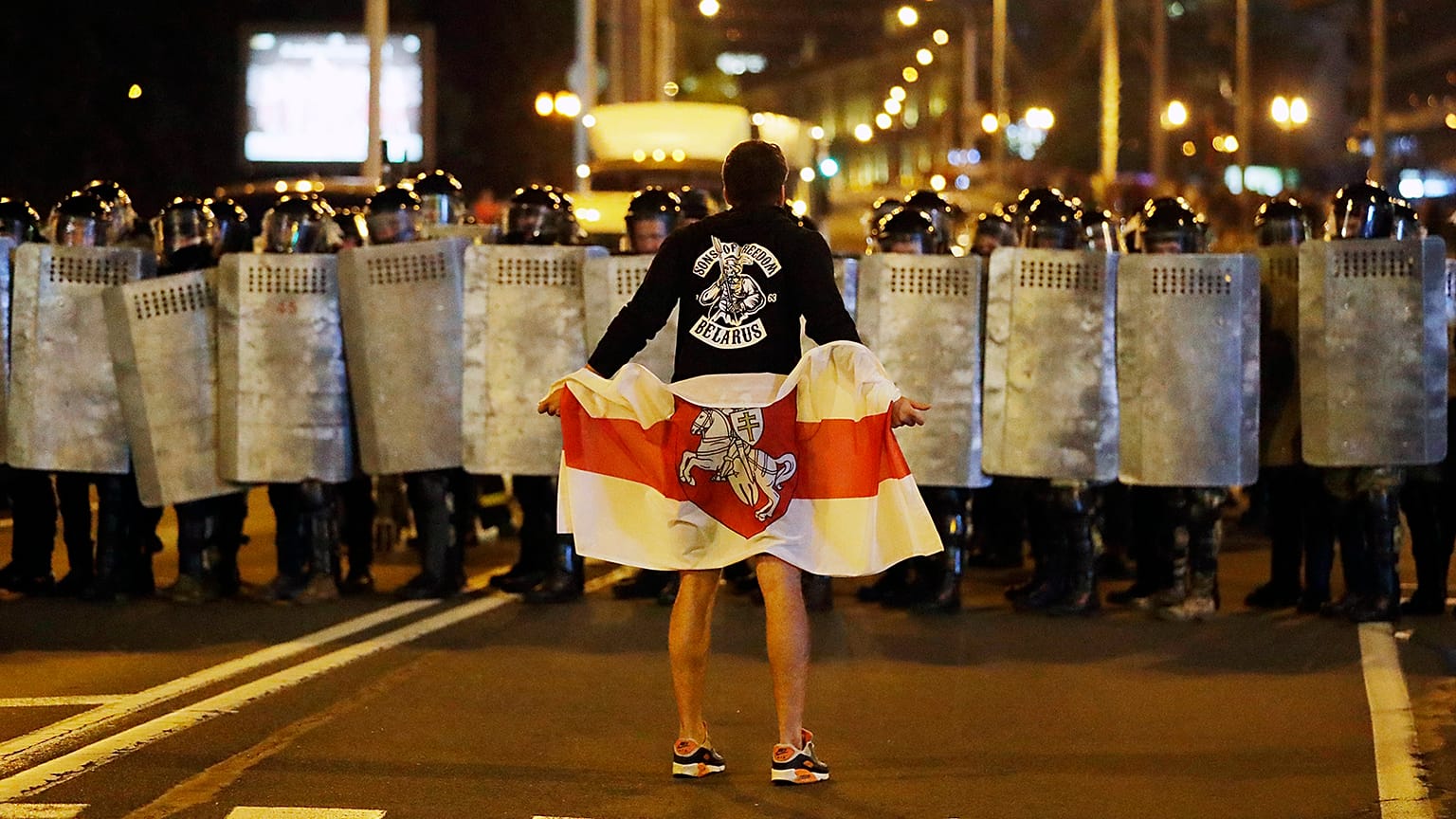The 9 August 2020 elections -- believed to have been rigged by strongman President Alexander Lukashenko -- sparked unprecedented protests, leading to a crackdown against opponents of the regime and tens of thousands of arrests.
Tuesday marks two years since the disputed presidential election in Belarus, which sparked a protest movement of unprecedented size in a country that has been labelled “the last dictatorship in Europe”.
 ADVERTISEMENT
ADVERTISEMENT
 ADVERTISEMENT
ADVERTISEMENT
Alexander Lukashenko was declared the victor -- by a landslide -- in the August 9 2020 vote.
In fact, he has been declared the winner of every presidential election held in the country since it split from the Soviet Union in the early 1990s.
Many believe he has held onto this position by rigging elections. This was the accusation of the opposition in Belarus, and tens of thousands of the general public, who took to the streets following the 2020 election result.
Sviatlana Tsikhanouskaya, who ran in the August 2020 presidential contest against Lukashenko following her husband's arrest, is thought by many to have won the election instead.
"I want to applaud Belarusians and friends of Belarus around the world for carrying our torch of freedom. You made sure that our voices are heard," Tsikhanouskaya said in a Twitter post on the anniversary of the 2020 election on Tuesday.
"On this Day of Solidarity with Belarus, two years after the stolen elections, I thank all who kept our light burning," she added.
Tsikhanouskaya fled Belarus two days after the election when Lukashenko cracked down on the ongoing protests. Some 11 people were killed in the clashes with the Belarus police with at least six considered to be missing, and thousands of people were arrested.
The European Union and the United States have branded the election fraudulent and imposed sanctions on high-ranking Belarusian officials for the violent repression of the mass pro-democracy demonstrations that followed the plebiscite.
In the aftermath of the election, as many as 30,000 were arrested for protesting against Lukashenko's reelection, with some declaring they were subjected to torture.
A 2020 United Nations Human Rights Office statement cited over 450 documented cases of torture and ill-treatment.
The regime has also cracked down on independent media and non-profit organisations, branding them "extremist" outfits and ordering their closure.
The death of Vitali Shishov, the director of the Belarusian House in Ukraine, in August 2021, also sparked fears that the KGB -- Belarus' intelligence agency that never changed its Soviet moniker -- might be intent on taking out people deemed dangerous to the Minsk regime.
The arrest of journalist Roman Protasevich after his Ryanair flight to Vilnius was diverted to Minsk was seen as another act of persecution of any opponents of Lukashenko by any means available.
'Minsk regime threat to neighbours'
The two years following the election have seen virtually the entire political opposition in Belarus locked up or forced to flee over the border, with Lukashenko and his government amending the constitution to give him even more executive powers than before.
Additionally, the Minsk regime has introduced severe penalties for any dissenting voices, further made worse by Russia's 24 February invasion of Ukraine, in which Lukashenko played a role as Russian President Vladimir Putin's key ally in the region.
Vocal opposition to Lukashenko is now punishable by death if the country's authorities -- considered to be completely under his control -- deem it an "act of terrorism".
The EU has levied further sanctions on Lukashenko and his associates, while opponents of his regime have turned into outright saboteurs.
The Railroad Partisan movement, which sprung from the opposition to Minsk's involvement in the Russian invasion of Ukraine, has seen the country's infrastructure regularly sabotaged to slow down or prevent the movement of Moscow troops as the Kremlin continues to use Belarus as a staging area for its attacks.
Meanwhile, Tsikhanouskaya has led the opposition movement in exile, becoming even more vocal after her husband -- a notable blogger and Lukashenko critic -- was doled out an 18-year prison sentence in December 2021.
For her fight against the Belarus strongman, Tsikhanouskaya has received many international plaudits, including European Parliament's Sakharov prize for human rights in 2020.
David Sassoli, the European Parliament president, said at the time: “The strength of your spirit has shown the way to revolution, which has taken power in the country in 2020 and we pay tribute to you and to your resistance and to your perseverance.”
Right before Russia's February invasion of Ukraine, Tsikhanouskaya told Euronews that “Belarus rule in regional security is crucial.
"Our crisis that started in illegal elections and crackdowns spilt over the region,” she said.
“The regime in Minsk became a threat to neighbours to the whole continent and it’s time to stop it right now.”














